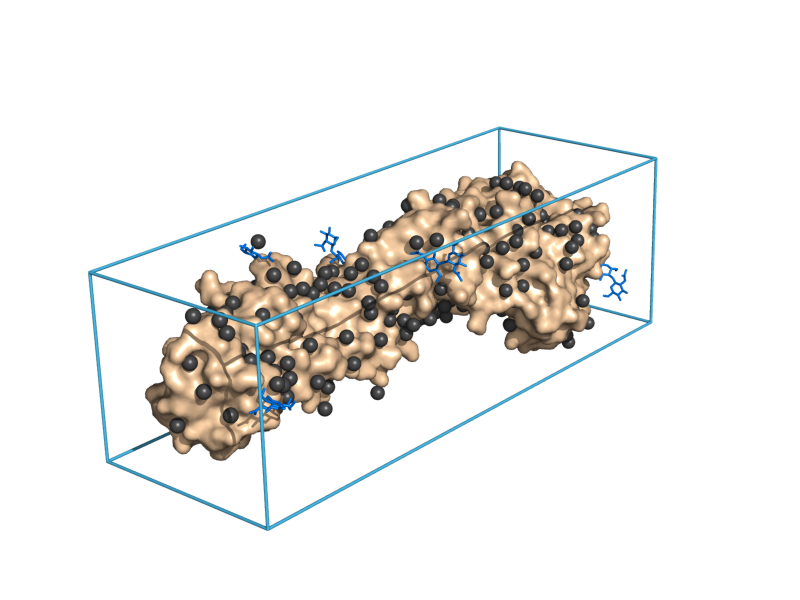This is a read-only mirror of pymolwiki.org
Difference between revisions of "DrawBoundingBox"
Jump to navigation
Jump to search
m (DrawMinBoundingBox moved to DrawBoundingBox: Now it can use padding, so it's not only min.) |
m |
||
| Line 137: | Line 137: | ||
cmd.load_cgo(boundingBox,boxName) | cmd.load_cgo(boundingBox,boxName) | ||
return boxName | return boxName | ||
| + | cmd.extend ("getBox", getBox) | ||
</source> | </source> | ||
Revision as of 19:13, 30 March 2009
Overview
Draws a bounding box around a given selection.
Example
run ~/drawBoundingBox.py
fetch 1jsd
drawBoundingBox 1jsd, r=0.33, g=0.80
Installation
Just copy the source to your computer. Then run
run /path/to/drawBoundingBox.py
# -*- coding: utf-8 -*-
from pymol.cgo import *
from pymol import cmd
from random import randint
from string import split
#############################################################################
#
# drawBoundingBox.py -- Draws a box surrounding a selection
#
#
# AUTHOR: Jason Vertrees
# DATE : 2/20/2009
# NOTES : See comments below.
#
#############################################################################
def drawBoundingBox(selection="(all)", padding=0.0, linewidth=2.0, r=1.0, g=1.0, b=1.0):
"""
DESCRIPTION
Given selection, draw the bounding box around it.
USAGE:
drawBoundingBox [selection, [padding, [linewidth, [r, [g, b]]]]]
PARAMETERS:
selection, the selection to enboxen. :-)
defaults to (all)
padding, defaults to 0
linewidth, width of box lines
defaults to 2.0
r, red color component, valid range is [0.0, 1.0]
defaults to 1.0
g, green color component, valid range is [0.0, 1.0]
defaults to 1.0
b, blue color component, valid range is [0.0, 1.0]
defaults to 1.0
RETURNS
string, the name of the CGO box
NOTES
* This function creates a randomly named CGO box that minimally spans the protein. The
user can specify the width of the lines, the padding and also the color.
"""
([minX, minY, minZ],[maxX, maxY, maxZ]) = cmd.get_extent(sel)
print "Box dimensions (%.2f, %.2f, %.2f)" % (maxX-minX, maxY-minY, maxZ-minZ)
minX = minX - float(padding)
minY = minY - float(padding)
minZ = minZ - float(padding)
maxX = maxX + float(padding)
maxY = maxY + float(padding)
maxZ = maxZ + float(padding)
if padding != 0:
print "Box dimensions + padding (%.2f, %.2f, %.2f)" % (maxX-minX, maxY-minY, maxZ-minZ)
boundingBox = [
LINEWIDTH, float(linewidth),
BEGIN, LINES,
COLOR, float(r), float(g), float(b),
VERTEX, minX, minY, minZ, #1
VERTEX, minX, minY, maxZ, #2
VERTEX, minX, maxY, minZ, #3
VERTEX, minX, maxY, maxZ, #4
VERTEX, maxX, minY, minZ, #5
VERTEX, maxX, minY, maxZ, #6
VERTEX, maxX, maxY, minZ, #7
VERTEX, maxX, maxY, maxZ, #8
VERTEX, minX, minY, minZ, #1
VERTEX, maxX, minY, minZ, #5
VERTEX, minX, maxY, minZ, #3
VERTEX, maxX, maxY, minZ, #7
VERTEX, minX, maxY, maxZ, #4
VERTEX, maxX, maxY, maxZ, #8
VERTEX, minX, minY, maxZ, #2
VERTEX, maxX, minY, maxZ, #6
VERTEX, minX, minY, minZ, #1
VERTEX, minX, maxY, minZ, #3
VERTEX, maxX, minY, minZ, #5
VERTEX, maxX, maxY, minZ, #7
VERTEX, minX, minY, maxZ, #2
VERTEX, minX, maxY, maxZ, #4
VERTEX, maxX, minY, maxZ, #6
VERTEX, maxX, maxY, maxZ, #8
END
]
boxName = "box_" + str(randint(0,10000))
while boxName in cmd.get_names():
boxName = "box_" + str(randint(0,10000))
cmd.load_cgo(boundingBox,boxName)
return boxName
cmd.extend ("getBox", getBox)
